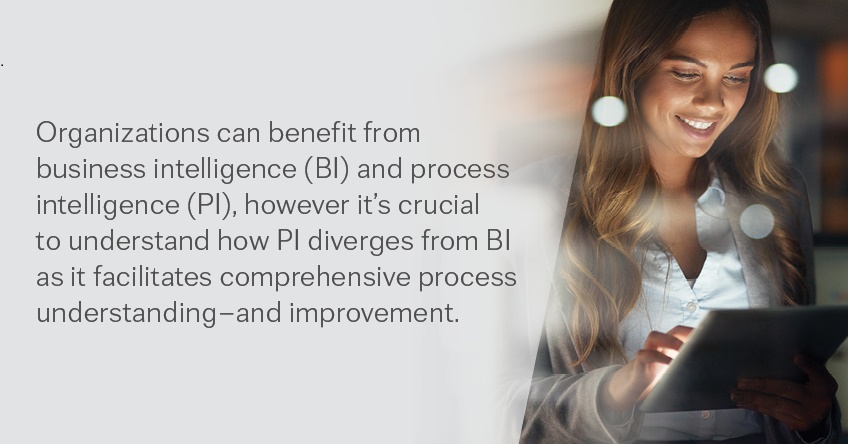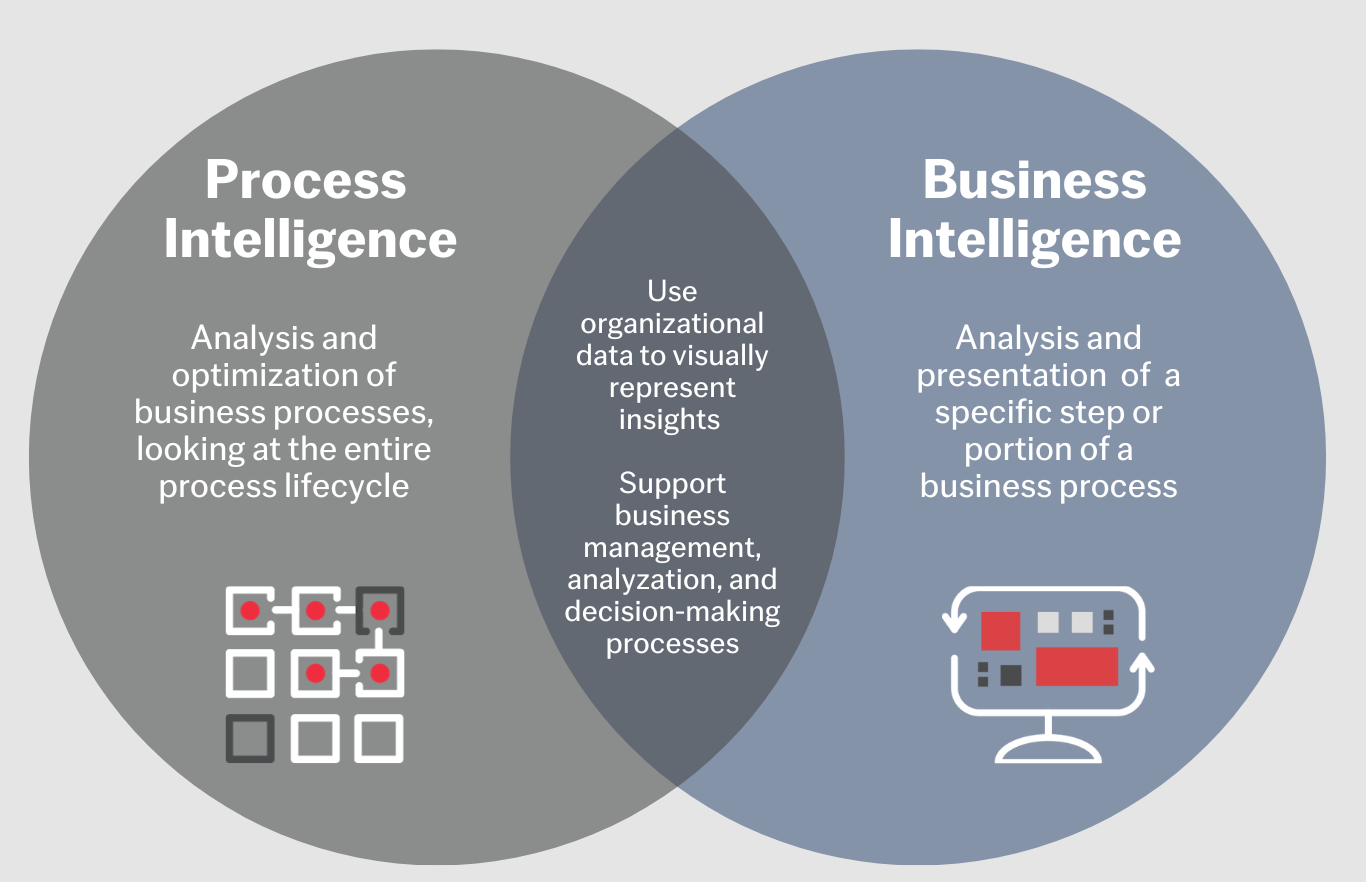
Utilizing Cookiebot Technology for Advanced Web Insights & Visitor Analysis

Utilizing Cookiebot Technology for Advanced Web Insights & Visitor Analysis
Process Intelligence vs Business Intelligence: What’s the Difference?
Scott Opitz
September 13, 2023

In today’s data-driven world, organizations are continually seeking ways to utilize their business information to make better decisions, optimize operations, and gain a competitive advantage. Two key technologies have emerged in the pursuit of quantifying and understanding intricate business processes, often likened to the central nervous system of any operation: business intelligence (BI) and process intelligence (PI).
While many are familiar with BI platforms for its visualization of data analysis insights, PI is a newer concept rapidly gaining traction as it can pinpoint near real-time process execution and provide insights that enhance all processes, including RPA. Discover how process intelligence, starting with process mining, leads to remarkable improvements in operational efficiency, cost savings, informed strategic decisions, and business excellence that deliver on customer expectations.
Jump to:
What is process intelligence (PI)?
What is business intelligence (BI)?
Differences between PI and BI
Key similarities
What is process intelligence (PI)?
Process intelligence is a collection of new data science approaches that focus on the analysis and optimization of business processes across all systems and applications involved end to end.
Sometimes referred to as a new generation of process analytics, process intelligence solutions go beyond traditional process mining . A process intelligence (PI) platform consists of the following core capabilities:
- Process mining uses actual data from information systems to create a model that accurately reflects how a process executes. It consists of event logs, audit trails, or any other records representing “breadcrumbs”.
- Task mining involves capturing and analyzing user interactions with desktop applications to perform tasks related to higher-level process execution. This is especially valuable when event logs or audit trails lack granular details about specific process steps.
- Process analytics is a tool designed specifically for interpreting multistep process data. This enables how different process execution patterns correlate to specific process characteristics and is instrumental in identifying bottlenecks, inefficiencies, compliance lapses, and opportunities for improvements.
- Process monitoring is an automation-driven monitoring of ongoing business process instances, aiming to quickly detect any deviations from expected behavior. This tool includes the ability to notify users or trigger actions in related environments in response to identified deviations.
- Process prediction is an artificial-intelligence-based approach to predict future outcomes by analyzing all possible variations of previous process instances.
- Process simulation empowers organizations to build “What if?” scenarios to test the potential impact of changes in process definitions or resource allocations, so you can assess the effectiveness of process optimization decisions, before committing time and resources to these changes.
When we explore the ‘Order to Cash’ process through the lens of PI, the focus shifts to a comprehensive understanding of all the variations and patterns within the processes end to end, including the implications of delayed or missed steps, impact of the process sequencing, and or the contributions of various individuals in specific instances in the process.
For example, process intelligence might reveal that a particular step in the process, such as order verification, is taking too long and subsequently causing delays that ripple throughout the process. Or PI might expose instances where crucial steps like credit checks are skipped, resulting in increased financial risk for the organization. Process intelligence provides a holistic perspective and can unveil critical insights into process dynamics and optimizations opportunities.
What is business intelligence (BI)?
Business intelligence, on the other hand, is a technology-driven process that involves the analysis and presentation of business information. The primary goal of BI is to help organizations make informed decisions by providing insights into their business operations, customer behavior, market trends, and competitive landscape.
From the analyst’s perspective, the most important elements of BI are:
- Data analysis: Analyzing the data to identify patterns, trends, and anomalies.
- Data visualization: Presenting the analyzed data in a visually accessible manner, such as dashboards, charts, and reports.
When we review the ‘Order to Cash’ process with BI tools, there are numerous ways to analyze how many new orders were received today or the breakdown of the orders based on salesperson, product family, geography, etc. Using these capabilities, an analyst might analyze the number of new orders received broken down by day for the last month, the most popular product families and how that may have changed over time, the regions with the highest sales stack ranked, or the salespersons with the highest order intake.
What BI cannot tell you, at least without a huge amount of custom development and complex SQL or related programming, is how those metrics were impacted by the execution of other parts of the process.
For instance, can you determine if instances where certain salespersons received the highest number of orders coincided with efficient customer interactions where inquiries were promptly addressed; and conversely, can you determine if low order rates correlated to slow response times or potentially overlooked customer inquiries, ignoring the attempt completely? This is where BI falls short as it’s unable to establish and reveal those connections.
Key differences between process intelligence and business intelligence
Focus
Process intelligence focuses on the analysis and optimization of business processes, looking at the entire process lifecycle. Business intelligence focuses on providing in-depth analysis of individual process steps.
Data sources
Process intelligence uses event logs, audit tables, user interactions, and desktop activities as primary data sources. Business intelligence uses data from various sources related to a specific step/portion of a business process in order to analyze and visualize patterns, trends, and anomalies.
Outcomes
Process intelligence provides insights that help organizations optimize their business processes, offering greater understanding of the global context of specific steps and variations between process instances. Business intelligence provides insights that help organizations make informed, data-driven decisions.
Tools
Process intelligence tools include process mining, task mining, analytics, monitoring, prediction, and simulation capabilities. Business intelligence tools typically include dashboards, reports, data analysis, and other visualization capabilities.
Key similarities between process intelligence and business intelligence
Process intelligence and business intelligence do have similarities: both use organizational data to visually represent insights that support business management, analyzation, and decision-making processes. The same data warehouses may be leveraged in both process intelligence and BI tools, however the insights provided will vary depending on each platform’s capabilities and limitations. This knowledge is fundamental for first-year business school students and professionals alike, as it forms the foundation for making informed decisions and optimizing business operations in a data-driven world.

Process intelligence and business intelligence: Which is best?
While business intelligence and process intelligence may seem similar initially, they serve different purposes in observing and analyzing an organization’s operations. BI provides insights on individual process steps, one by one, allowing for detailed analysis of conventional dimensional breakdowns, while PI provides a comprehensive understanding of business processes and insights for impactful improvements.
It is important for those new to process intelligence and process mining to understand that while BI and PI may seem similar, they are very different in their abilities and focus. Both are essential for organizations looking to improve their operations and gain a competitive edge. Understanding the key differences between BI and PI is crucial for selecting the right tools and approaches to meet your organization’s goals.
To see how process intelligence can put your data to work for actionable insights, contact us via this form or join us for a lively discussion in an upcoming webinar.
Process Mining Intelligent Automation Digital Transformation

Scott Opitz
Chief Technology Officer at ABBYY
Scott Opitz is Chief Technology Officer and responsible for the global product strategy and execution. Prior to this, he held the position of Chief Marketing Officer, driving global marketing strategies. He joined ABBYY with the acquisition of TimelinePI, for which he was co-founder, President, and CEO from its inception. In this role, he oversaw the integration of TimelinePI’s process intelligence products (now ABBYY Timeline ) into ABBYY’s worldwide sales and distribution channels.
A 30-year veteran of the computer industry, Scott has founded and built companies in the application integration, business process management, and business intelligence spaces. Scott founded and served as President and Chief Executive Officer of Altosoft Corporation, a business intelligence software company that was ultimately acquired by Kofax. Following the acquisition of Altosoft, Scott served as Senior Vice President & General Manager for Analytics.
In previous positions, Scott served as Senior Vice President, Worldwide Marketing & Business Development for webMethods (now Software AG), where he was responsible for webMethods’ marketing, business development, and strategic product planning. He joined webMethods as a result of its acquisition of IntelliFrame Corporation, a provider of data integration products and the InVista integrated workflow and BPM platform that he co-founded. Scott has also held numerous executive-level positions in technology, marketing and business development roles for public and private companies.
Like, share or repost
Share
Subscribe for blog updates
First name*
E-mail*
Сountry*
СountryAfghanistanAland IslandsAlbaniaAlgeriaAmerican SamoaAndorraAngolaAnguillaAntarcticaAntigua and BarbudaArgentinaArmeniaArubaAustraliaAustriaAzerbaijanBahamasBahrainBangladeshBarbadosBelgiumBelizeBeninBermudaBhutanBoliviaBonaire, Sint Eustatius and SabaBosnia and HerzegovinaBotswanaBouvet IslandBrazilBritish Indian Ocean TerritoryBritish Virgin IslandsBrunei DarussalamBulgariaBurkina FasoBurundiCambodiaCameroonCanadaCape VerdeCayman IslandsCentral African RepublicChadChileChinaChristmas IslandCocos (Keeling) IslandsColombiaComorosCongo (Brazzaville)Congo, (Kinshasa)Cook IslandsCosta RicaCroatiaCuraçaoCyprusCzech RepublicCôte d’IvoireDenmarkDjiboutiDominicaDominican RepublicEcuadorEgyptEl SalvadorEquatorial GuineaEritreaEstoniaEthiopiaFalkland Islands (Malvinas)Faroe IslandsFijiFinlandFranceFrench GuianaFrench PolynesiaFrench Southern TerritoriesGabonGambiaGeorgiaGermanyGhanaGibraltarGreeceGreenlandGrenadaGuadeloupeGuamGuatemalaGuernseyGuineaGuinea-BissauGuyanaHaitiHeard and Mcdonald IslandsHoly See (Vatican City State)HondurasHong Kong, SAR ChinaHungaryIcelandIndiaIndonesiaIraqIrelandIsle of ManIsraelITJamaicaJapanJerseyJordanKazakhstanKenyaKiribatiKorea (South)KuwaitKyrgyzstanLao PDRLatviaLebanonLesothoLiberiaLibyaLiechtensteinLithuaniaLuxembourgMacao, SAR ChinaMacedonia, Republic ofMadagascarMalawiMalaysiaMaldivesMaliMaltaMarshall IslandsMartiniqueMauritaniaMauritiusMayotteMexicoMicronesia, Federated States ofMoldovaMonacoMongoliaMontenegroMontserratMoroccoMozambiqueMyanmarNamibiaNauruNepalNetherlandsNetherlands AntillesNew CaledoniaNew ZealandNicaraguaNigerNigeriaNiueNorfolk IslandNorthern Mariana IslandsNorwayOmanPakistanPalauPalestinian TerritoryPanamaPapua New GuineaParaguayPeruPhilippinesPitcairnPolandPortugalPuerto RicoQatarRomaniaRwandaRéunionSaint HelenaSaint Kitts and NevisSaint LuciaSaint Pierre and MiquelonSaint Vincent and GrenadinesSaint-BarthélemySaint-Martin (French part)SamoaSan MarinoSao Tome and PrincipeSaudi ArabiaSenegalSerbiaSeychellesSierra LeoneSingaporeSint Maarten (Dutch part)SlovakiaSloveniaSolomon IslandsSouth AfricaSouth Georgia and the South Sandwich IslandsSouth SudanSpainSri LankaSurinameSvalbard and Jan Mayen IslandsSwazilandSwedenSwitzerlandTaiwan, Republic of ChinaTajikistanTanzania, United Republic ofThailandTimor-LesteTogoTokelauTongaTrinidad and TobagoTunisiaTurkeyTurks and Caicos IslandsTuvaluUgandaUkraineUnited Arab EmiratesUnited KingdomUnited States of AmericaUruguayUS Minor Outlying IslandsUzbekistanVanuatuVenezuela (Bolivarian Republic)Viet NamVirgin Islands, USWallis and Futuna IslandsWestern SaharaZambiaZimbabwe
I have read and agree with the Privacy policy and the Cookie policy .
I agree to receive email updates from ABBYY Solutions Ltd. such as news related to ABBYY Solutions Ltd. products and technologies, invitations to events and webinars, and information about whitepapers and content related to ABBYY Solutions Ltd. products and services.
I am aware that my consent could be revoked at any time by clicking the unsubscribe link inside any email received from ABBYY Solutions Ltd. or via ABBYY Data Subject Access Rights Form .
Referrer
Last name
Query string
Product Interest Temp
UTM Campaign Name
UTM Medium
UTM Source
ITM Source
GA Client ID
UTM Content
GDPR Consent Note
Captcha Score
Page URL
Connect with us
Also read:
- [New] Building Dynamic Photographic Ensembles
- [Updated] In 2024, Exciting Vlog Subjects Daily Selection
- [Updated] Luminous Leap Quick Brightening Tricks for iPhone Recordings
- 2024 Approved How to Use Creative Commons Copyright Licenses?
- 解決策:Windows 10内でVoice Recorderが使えない場合
- 上達! YouTuber向けの最適なビデオエンコード機能 - ライブ配信&動画投稿対応
- Best Mac-Compatible HEVC Encoder and Decoder Apps of 2024
- Exploring Major Social Channels: The Power of Facebook, Twitter, Instagram & Youtube
- How To Revive Your Bricked Itel A60s in Minutes | Dr.fone
- New 2024 Approved Get Started with Cartoon Videos Top 10 Beginner-Friendly Tools
- Transforming Videos From MP4 Format to MJPEG - Essential Tips and Tricks
- Two Easy & Free Methods: Transforming NRG Into ISO Files
- Ultimate List of Freeware Tools for Downloading YouTube Content without Limits
- Xbox Series X Controller Parts Breakdown
- Title: Utilizing Cookiebot Technology for Advanced Web Insights & Visitor Analysis
- Author: Brian
- Created at : 2024-10-03 20:40:41
- Updated at : 2024-10-05 22:27:02
- Link: https://discover-best.techidaily.com/utilizing-cookiebot-technology-for-advanced-web-insights-and-visitor-analysis/
- License: This work is licensed under CC BY-NC-SA 4.0.